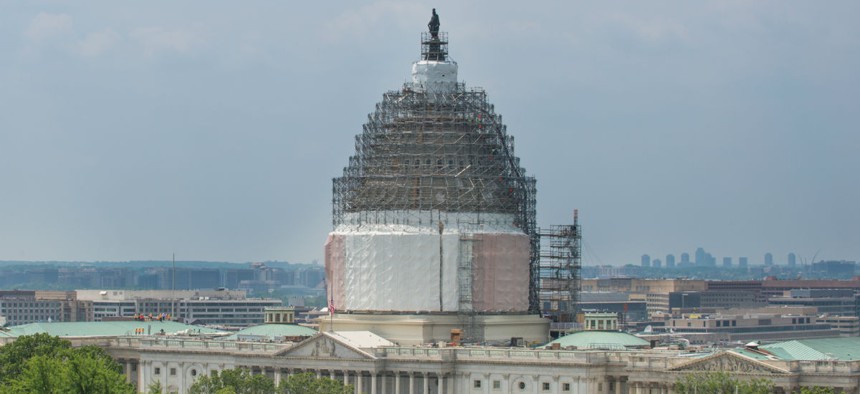
Architect of the Capitol
Does Congress Really Need a $17 Million Subsidy to Send Mail?
Report questions the utility of a centuries-old perk.
“Since colonial times,” begins a recent Congressional Research Service report, members of Congress have been entitled to communicate with their constituents using the U.S. Postal Service on the taxpayers’ dime.
While the rules specifying who can take advantage of the practice known as “franking” and how they can go about it have frequently changed since the First Continental Congress gave itself the perk, the general privilege lives on, nearly two and a half centuries later. Lawmakers have cut its use dramatically in recent decades, but the benefit still cost taxpayers $16.9 million in fiscal 2014, according to the CRS report.
Since the 19th Century, the privilege has come under criticism as wasteful and unnecessary. Today, CRS said condemnations of the program and attempts at legislative fixes have focused on four areas: its excessive price tag, the potential for it to be abused for political or personal gain, the unfair advantage it provides for congressional incumbents seeking reelection and its diminished utility with the advent of newer forms of communication.
CRS pointed to some evidence of franking’s political usage. While lawmakers sent nearly $17 million worth of mailings in fiscal 2014, they sent just $7.6 million worth in fiscal 2013. That drop off represented a “historical trend” of decreased spending in a non-election year, CRS said.
Franking was vulnerable to far more abuse in the past, leading to an array of reforms that have alternatively loosened and tightened restrictions.
The elasticity of the reforms “reflects a normative ambiguity about the privilege, with Congress seeking to balance a perceived democratic need for the franking privilege against charges of abuse, wastefulness and incumbency protection,” CRS wrote.
Recent changes have attempted to confine the use of free mail while increasing oversight. In 1986, Congress implemented the first limits on individual lawmaker’s use of franking; in 1992, the first prohibition on mass mailings outside a House member’s district was instituted. There is now a franking commission that reviews mass mailings to ensure they are not overly political, and members are prohibited from using the privilege when they are facing an election within 90 days. Those changes cut franking 85 percent between fiscal 1988 and fiscal 2014.
Still, there are those who want to continue to reform franking, including calls to abolish it altogether. Others would like to see lawmakers only allowed to send mail without incurring the expense when responding to an official inquiry. Additional reform proposals, as spelled out by CRS, include prohibiting mass mailings, extending the pre-election ban and reducing the allowance each member receives to send mail. Congress could also prohibit unsolicited mailings -- meaning recipients would have to proactively sign up to receive franked mail, much like lawmakers’ email subscribers -- or provide franking privileges for its electoral opponents.
Defenders of franking say it helps to even out the natural advantage the president has in communicating with American citizens through dominant exposure, and provides an avenue for representatives to connect directly with their constituents. Critics say that argument is becoming increasingly difficult to make in the Internet age. Lawmakers have more than 200 years of history on their side, however, and do not appear to be in any rush to self-impose more restrictions on their own perk.







